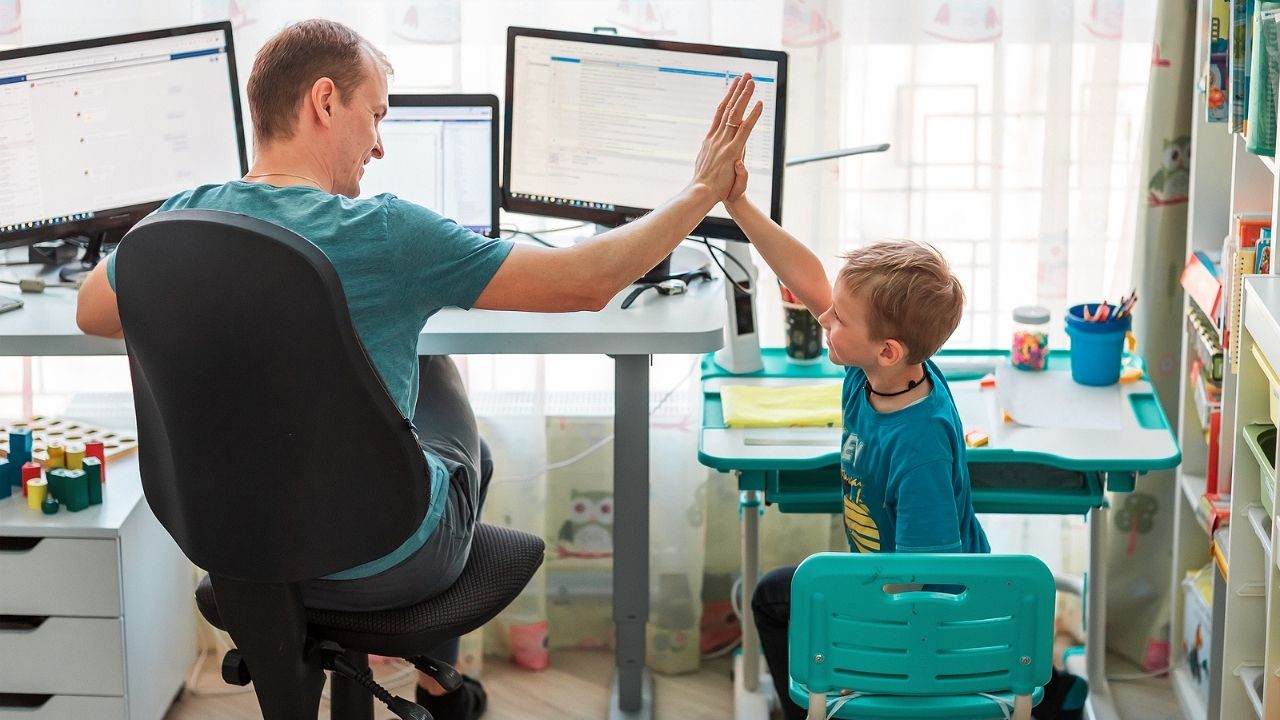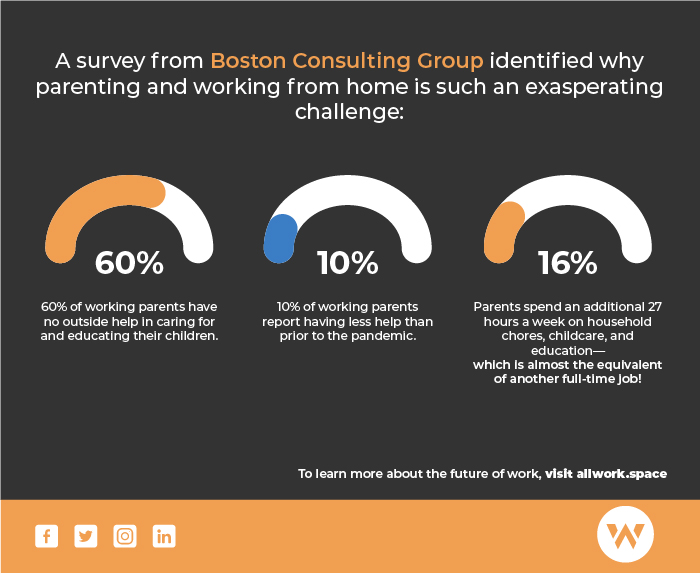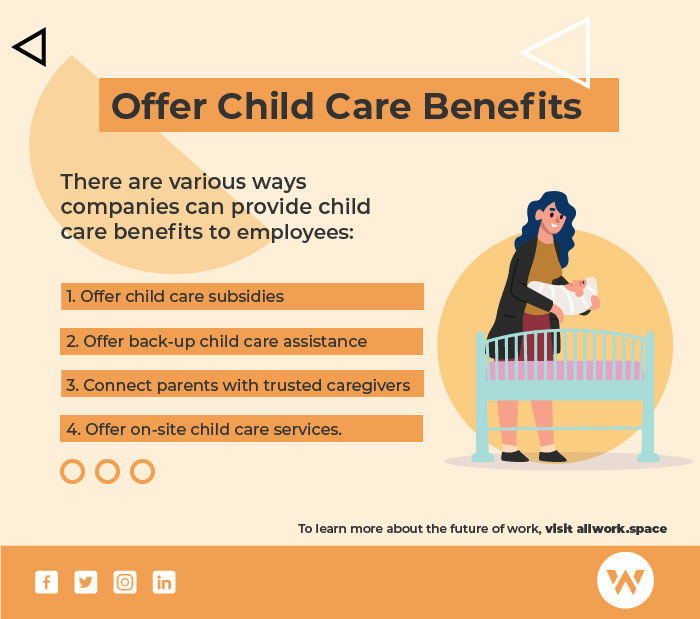

- The struggles of parenting while working from home.
- Making WFH work for working parents.
- Working parents need more from their employers.
Parents, especially working mothers, have borne the brunt of the coronavirus pandemic, at least when it comes to working from home. While most people forced into a remote work situation struggled with a plethora of issues and challenges, parents have faced specific obstacles that make parenting and working from home feel downright impossible at times.
Before we dive into the struggles of parenting while working from home and working from home while parenting, let’s take a look at some statistics.
A survey from FlexJobs found that:
- 21% of working parents reduced their hours.
- 16% of working parents quit their job.
- 4% of working parents had one partner reduce their hours.
A survey from Boston Consulting Group identified why parenting and working from home is such an exasperating challenge:

- 60% of working parents have no outside help in caring for and educating their children.
- 10% of working parents report having less help than prior to the pandemic.
- Parents spend an additional 27 hours a week on household chores, childcare, and education—which is almost the equivalent of another full-time job!
Childcare can be a full-time job, and the pandemic turned it into one that can throw parents into a never-ending loop of extra hours during the traditional workday to manage their child’s education, care, and even entertainment — all while trying to work their full-time job.
As the pandemic forced many schools and daycare centers to close, working parents soon found themselves at home trying to figure out how to work remotely – and help their children with the abrupt shift to virtual and home school.
This situation became even more challenging, in some cases, for the many parents who had essential jobs without a remote option or those who lost their jobs – or had to quit because of young school children who suddenly would not be going to school for most of the day.
The Pew Research Center found that the shares of mothers and fathers who were employed and at work in September 2020 were smaller than in September 2019.
“Among mothers, this share decreased from 69.0% to 63.4% and, among fathers, it decreased from 90.5% to 85.6% over this period. The drop in the share of mothers working was about the same as the drop among fathers, 5.6 vs. 4.9 percentage point”
The Struggles of Parenting while WFH

As a new mom, I know all too well how difficult it can be to juggle a full-time job with a child while working remotely. And I have it easy compared to others—full flexibility from my company and a spouse that does most of the heavy lifting at home.
And still, it’s tough.
It’s tough to find time for partners, it’s tough to stop working at a decent hour (I’ve been known to work past 10:00 p.m. more evenings than I care to admit), and it’s easy to get side-tracked by housework or entertaining kids.
Even before the pandemic, forums and online community boards were filled with questions like:
- How do you manage work from home with kids?
- How do I keep my child occupied while working from home?
- Is it possible to work from home with a baby?
These are common questions. And there is no simple answer; it’s not really a matter of yes or no (more on this later).
My kid isn’t even school age yet. I cannot begin to imagine how challenging it has been for parents whose kids are attending school remotely; kids that are full of energy and fully mobile (therefore requiring more activities and entertaining), and that miss their friends. When you factor in pandemic-related stress and anxiety, it’s no surprise that parents are struggling and burnt out.
Below are just a few of the many struggles working parents face daily while working from home.
There’s only 24 hours a day
Keeping up a house is a full-time job; cooking, cleaning, laundry, grocery shopping, paying bills, and organizing take a lot of time and energy. Raising kids is also a full-time job, and you don’t even get the weekends off.
If you have a full-time job, you spend 40 hours a week working (if not more), and if you add 27 hours a week (on average) that you spend doing housework, that leaves you with 101 hours “free” time a week. If you subtract 56 hours a week that you spend sleeping (it is recommended that we sleep for 8 hours each day), that leaves parents with only 45 hours a week to eat, take care of kids, and throw in some self-care.
Because of the pandemic, however, you also need to add home-schooling your kids and other care during the day — to the overflowing list of items parents need to manage during the day.
Suddenly, 24 hours doesn’t seem like nearly enough…at least if you want to have a few luxuries like some personal time, a hobby, or a date with your spouse.
More Interruptions
All workers, whether they are parents or not, are likely interrupted on a daily basis at some point during the workday. But parents have it worse. A Pew Research Center survey from late last year found that:
“Parents who are teleworking are having a harder time getting their work done without interruptions. Half of parents with children younger than 18 who are working at home all or most of the time say it’s been difficult for them to be able to get their work done without interruptions since the coronavirus outbreak started. In contrast, only 20% of teleworkers who don’t have children under 18 say the same. Mothers and fathers are about equally likely to say this has been difficult for them.”
Constant interruptions make it harder for working parents to find a workflow that works for them. As a result, parents are more likely than non-parents to say they struggle with meeting deadlines and completing projects on time.
Lack of Proper Workspace

Children take up a lot of space, and many parents, especially those that live in cities, don’t have a lot of extra space to set up a home office. Take it from someone who works from a living room couch, the floor, or a dining table.
The same Pew Research Center survey found that “parents are somewhat more likely than adults without minor children to say it’s been difficult for them to have an adequate workspace – 28% vs. 19%.”
Several studies have found a link between the physical work environment and productivity.
“Temperature, air quality, lighting, and noise conditions in the office affect the work concentration and productivity. Numerous studies have consistently demonstrated that characteristics of the physical office environment can have a significant effect on behavior, perceptions, and productivity of employees.”
If working parents do not have the space or resources to set up an adequate workspace, their productivity will undoubtedly suffer.
How to Overcome the Hurdles of WFH while Parenting

If you’re a parent, you might be wondering if it is even possible to work from home with family.
The answer is yes.
The Latest News
Delivered To Your Inbox
How do I know this? Because I’ve been doing it for almost a year, and there are countless parents out there that have managed to do it for a lot longer.
It is possible to WFH with kids. But it is definitely not easy, not by a long shot.
Keep in mind that your kids’ age also has a huge impact. Working from home with a baby that is not yet mobile is easier than working from home with toddlers (at least for some). For many parents, working from home with toddlers is impossible without assistance. That being said, once kids get older and more independent, it may get easier.
So, how do these mythical creatures (WFH parents that are successful at parenting and working) actually do it?
There’s no WFH guide that will work for all parents, but there are a few things that definitely help.
Plan Ahead
Plan activities and schedules in advance. This makes it easier for working parents to determine when they will be able to schedule meetings or tackle tasks or projects that require deep focus.
Obviously, it’s not always possible to plan ahead, especially if you have a baby or infant that’s not yet on a schedule. If that’s the case for you, then you may want to lean on your support network (family or friends) — especially if your job is high stress and/or requires a lot of deep focus.
Have a Routine
This is much easier said than done, especially with younger children whose routines seem to change on a monthly (if not weekly) basis.
However, having routines makes it easier to plan ahead. Waking up around the same time every day, going to bed around the same time every day, eating breakfast/lunch/dinner around the same time every day can help WFH parents get into a rhythm while keeping some separation between home life and work life.
Pro tip: incorporate some “me time” into your routine; it’s hard, but it’s key to success.
Set Expectations with Your Partner
Regardless of whether only one or both parents are working from home, communication between partners is key to success.
Be sure to lay out your expectations and communicate your needs. If you know you have a big project coming up that will require extra time, be sure to communicate with your partner so they know you will lean on them more than usual.
If both parents work and the workload is intense, consider hiring some help, even if just for a couple of days or weeks.
When setting expectations, it’s also important to take into consideration housework. Who will be responsible for what; how will duties be distributed equally among partners?
Do These Strategies (actually) Work?

Some of the time.
Sometimes simply planning for the chaos of everyday life with kids is exactly what parents need to carve out the time to sit down and work without (or with the least) interruptions. More often than not, the going back and forth between work and taking care of kids every 10-15 minutes is more exhausting than doing either work or parenting for a longer stretch.
Constantly shuffling between parenting and work makes it harder to focus, meaning tasks take longer and are done with less consistency. Avoiding that problem means the worker can focus and achieve more in less time—this is why having a routine and planning ahead can make all the difference.
By planning out activities for the child and scheduling free time dedicated to them outside of work, parents avoid making the child compete with work for their attention. Ensuring parenting-related tasks are evenly divided between the parents also has the benefit of making everyone feel equally involved, eliminating grounds for resentment.
What about the rest of the time?
It’s a wild card.
Which is why to make WFH work for working parents, companies need to do more. Some parents are single-parents, others live far away from family and friends—the saying “it takes a village to raise a child” is true, and some parents don’t have their village nearby to support them, and others need to juggle more than one job to make ends meet.
Working Parents Need More from Their Employers

Recent data has found that there’s been a mass exodus of parents, specifically women, from the workforce.
To keep parents in the workforce and to encourage those who dropped out to return, companies will need to do more for them.
A recent FlexJobs survey of working parents found that the number one way organizations can support working parents is by offering remote work and flexible schedules.
Remote work and flexible schedules, however, are only the tip of the iceberg. Below are some other ways companies can support parents.
More Empathy from Leaders and Managers
Sometimes parents need to take the day off or a few hours off to take care of their kids. Having empathetic leaders that understand that sometimes schedules and activities do not go as planned can help relieve some of the stress and anxiety parents feel on a regular basis.
In a hybrid work setting, this might mean managers that understand that sometimes kids will be screaming in the background, that some meetings will need to be cut short, or that sometimes it will be impossible to join because a kid fell sick.
Provide Longer Paid Parental Leave (for both parents)
Twelve weeks off is not nearly enough; it’s as simple as that. To make matters worse, sometimes parental leave is not only too short, but it is also unpaid. UNICEF and New America both recommend a minimum of six months of paid parental leave.
According to New America, paid parental leave not only improves child and parent physical and mental health, but also increases family economic security and increases the likelihood of women returning to work.
Offer Child Care Benefits

There are various ways companies can provide child care benefits to employees:
- Offer child care subsidies
- Offer back-up child care assistance
- Connect parents with trusted caregivers
- Offer on-site child care services.
Offer Wellness Benefits

Working parents have a harder time balancing work life with home life; they are also at an increased risk of burnout. This makes it imperative that companies support the wellbeing of working parents by offering robust wellness programs.
Some ideas include:
- Mental health support
- A spending account that covers child care
- Meal planning or meal stipend
- Gym / fitness center memberships
- Home office expense account (whether to set up the right home office at home or to get a coworking membership).
Closing Thoughts
Working from home while parenting is challenging enough as it is. The coronavirus pandemic has undoubtedly made it harder for parents to balance both workload and parenting duties.
While some days it may feel impossible to parent while working from home, it is possible to do so—especially if you are able to plan ahead and stick to a routine.
That being said, the coronavirus pandemic has created the perfect opportunity for employers to rethink how they support parents. While paid parental leave is a good start, working parents need more than that, they need ongoing support from their employers.
Share this article
from WordPress https://ift.tt/3hJVZP7
via IFTTT

No hay comentarios:
Publicar un comentario